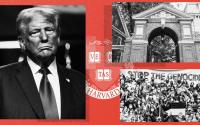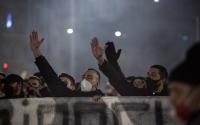Common Dreams / Published on Thursday, December 15, 2005 by the Inter Press ServSanjay Suri
A global public opinion survey shows people losing faith in governments, business and even non-governmental organizations.
The survey showing "an alarming picture of declining levels of trust" was conducted for the World Economic Forum, to meet in Davos in Switzerland next month, by GlobeScan, a public opinion research firm, and is based on interviews with more than 20,000 people in 20 countries.
"What the survey shows is people losing faith in a whole range of institutions," Mark Adams from GlobeScan told IPS by phone from Geneva. "This is very worrying for the world community."
The Russian government is now the only institution in any country polled to have consistently increased trust since 2001, the survey shows.
Trust in government has fallen the most in Brazil, South Korea, Mexico, Canada and Spain, followed closely by Argentina and the United States, the survey shows. In Nigeria trust in the national government fell by 13 points while trust in all other institutions rose.
"Even in countries such as Britain and India, where trust remains positive, it has suffered its biggest fall since tracking began in 2001," the report says. "Only in Italy, Indonesia and France has trust in the national government held steady, although polling was completed prior to the recent riots across France."
The poll also reveals that public trust in the United Nations has fallen over the past two years.
The survey shows that trust in a range of institutions has dropped significantly since January 2004 to levels not seen since the months following the Sep. 11, 2001 terrorist attacks.
"The report shows that the cement which holds world institutions together is coming adrift," Adams told IPS.
The loss of faith could partly be a consequence of globalization, he said. "In the cosy world of 30, 40 years back, people relied on governments and companies to do everything," Adams said. "But it's now a more complicated and dangerous world out there."
Governments and companies "are themselves struggling to come to terms with a new world order," Adams said, which suggests that these are no longer the firm edifices people had come to lean on in earlier times.
Among the highlights of the report:
Public trust in national governments, the United Nations and global companies is now at its lowest level since tracking began in January 2001. Since 2004, trust in government has declined by statistically significant margins in 12 of the 16 countries for which tracking data is available. The UN, while continuing to receive higher trust levels than other institutions, has experienced a significant decline in trust from 2004 levels in 12 of the 17 countries for which tracking data is available, suggesting an impact of the scandal over the Iraq oil-for-food program. Public trust in companies has also eroded over the last two years. After recovering trust in 2004, it has since declined for both large national companies and for global companies. Trust in global companies is now at its lowest level since tracking began. NGOs remain the leaders in trust, but they also have to contend with some decline. In 10 of 17 countries for which data is available, trust in NGOs has fallen since 2004, in some cases sharply, as in Brazil, India and South Korea.
"This is a wake-up call for the World Economic Forum meeting at Davos in January," Adams said. "If we do not regain the trust of people, the world will become ungovernable."
People feel "rightly or wrongly that systems are not delivering," he said. The World Economic Forum will have to find creative ways of addressing this problem, he said.
The survey involving a total of 20,791 interviews was conducted between June and August 2005 by research institutes in each participating country, under the leadership of GlobeScan. The survey asked respondents how much they trust each institution "to operate in the best interests of our society".






